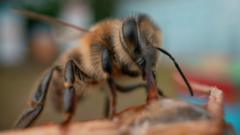Can a New Superfood Help Save Honeybees?

This article discusses a groundbreaking development in beekeeping: a honeybee "superfood" designed to combat the effects of climate change and habitat loss on bee populations. This innovative supplement has been shown to significantly increase the survival rate of baby bees, highlighting its potential to support the vital role honeybees play in global food production.
Last updated: 26 October 2023 (BST)
Key Takeaways
- A newly developed honeybee superfood can enhance baby bee survival rates by up to 15 times.
- The supplement addresses nutritional deficiencies faced by bees due to habitat loss and climate change.
- Honeybees are responsible for pollinating approximately 70% of the world's major crops.
- Research conducted at the University of Oxford has led to engineering yeast to produce essential nutrients for bees.
- Further trials of the superfood are planned, with potential availability for beekeepers within two years.
The Importance of Honeybees
Honeybees are more than just producers of honey; they are a cornerstone of agricultural productivity. Responsible for pollinating about 70% of the world's leading crops, including fruits, vegetables, and nuts, their decline poses a significant threat to global food security. The challenges faced by honeybee populations are multifaceted, including climate change, habitat loss, and diseases that have resulted in alarming annual colony losses—reported between 40-50% in some regions over the past decade.
Understanding the Decline of Honeybee Populations
In the UK, beekeepers are increasingly witnessing severe declines in their colonies. For instance, Nick Mensikov, chair of the Cardiff, Vale and Valleys Beekeepers Association, reported losing 75% of his colonies last winter. This trend echoes the struggles faced by beekeepers across South Wales and beyond. The phenomenon of bees dwindling despite ample food sources raises concerns about underlying nutritional deficiencies.
Nutritional Needs of Honeybees
Honeybees rely primarily on pollen and nectar, which offer essential nutrients including sterols—lipids critical for their development. However, when beekeepers harvest honey or when natural pollen sources dwindle, bees often lack these vital nutrients. Traditionally, supplementary foods have been inadequate, comprising mainly protein flour, sugar, and water, which do not meet the complete nutritional needs of these insects.
The Breakthrough: Engineering Bee Nutrition
Professor Geraldine Wright and her team at the University of Oxford have made significant strides in addressing this issue. After 15 years of research, they have successfully engineered yeast capable of producing the six essential sterols required by honeybees. This technological breakthrough means that a comprehensive nutritional supplement can now be created, ensuring bees receive the nutrients they need to thrive.
The Laboratory Process
In a dedicated lab environment, PhD student Jennifer Chennells experiments with creating the superfood. Using common kitchen equipment, she combines various proteins, fats, carbohydrates, and micronutrients to develop a food that appeals to bees. The process involves trial and error to determine the optimal mix for their health.
Results of the Superfood Trials
In trials, honeybee colonies fed the newly developed superfood showed remarkable results, with up to 15 times more baby bees reaching adulthood compared to control groups. This significant increase suggests that improved nutrition directly correlates with better survival rates and overall health. Professor Wright emphasises that with adequate nutrition, bees are likely to be healthier and less susceptible to diseases, which can alleviate some of the pressures they currently face.
Addressing Seasonal Challenges
One of the pressing concerns addressed by this research is the nutritional stress that honeybees experience during seasons with poor pollen production. In years like the current one, where flowering plants stop producing early, the superfood could be vital for ensuring bees have enough nutrients to survive the winter months. The longer bees go without sufficient pollen, the higher the risk of increased mortality rates during the colder months.
The Future of Honeybee Nutrition
As the research progresses, larger-scale trials are planned to better understand the long-term impacts of the superfood on honeybee health. If successful, beekeepers and farmers may have access to this innovative supplement within the next two years, potentially transforming beekeeping practices and contributing positively to global food production.
Conclusion: A Potential Lifeline for Honeybees
The development of this honeybee superfood represents a significant advancement in efforts to combat the decline of honeybee populations. By ensuring that these crucial pollinators receive complete nutrition, we may safeguard not only their health but also the health of the ecosystems and agricultural systems that depend on them. As further research unfolds, the hope is that this breakthrough will pave the way for sustainable beekeeping and food production practices in the face of ongoing environmental challenges. How can we, as a society, further support the protection of honeybees and their habitats?
#Honeybees #Beekeeping #ClimateChange
FAQs
What is the honeybee superfood?
The honeybee superfood is a newly developed nutritional supplement designed to provide honeybees with essential sterols and nutrients, helping them thrive despite environmental challenges.
How does the superfood improve bee health?
The superfood enhances bees' nutrition, leading to higher survival rates of baby bees. It addresses nutritional deficiencies that contribute to declining bee populations.
When will the superfood be available for beekeepers?
The honeybee superfood could be available to beekeepers and farmers within two years, pending further large-scale trials to assess its long-term effects.
Why are honeybees important?
Honeybees play a vital role in pollinating about 70% of the world's major crops, making them essential for global food production and biodiversity.
What challenges do honeybees face?
Honeybees face various challenges, including habitat loss, climate change, nutritional deficiencies, and diseases, leading to significant declines in their populations.
Published: 2025-08-20 15:09:04 | Category: technology



